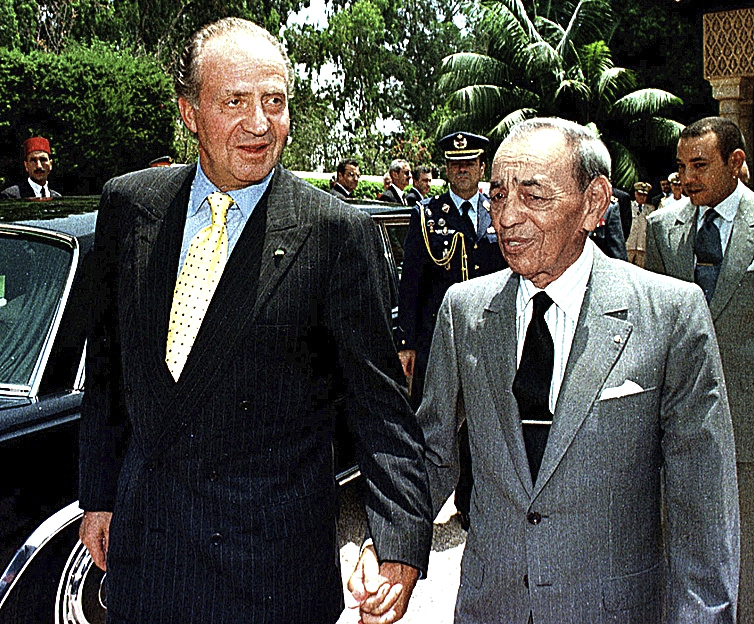Foreign Affairs Sánchez supports for the first time that the Sahara be an autonomous province of Morocco
Reactions Yolanda Díaz and Podemos flatly reject the historical turn of the Government with the Sahara: "The only solution is the referendum"
The conflicts of any colonization begin from the moment of the first occupation.
But in the case of Western Sahara, if there is a moment of obvious tension between Morocco and
Spain
, it is the one that occurred 46 years ago, with a dying Spanish dictator and a Moroccan king who detected an unrepeatable opportunity to replace Spain in control of an extensive territory, desert but with abundant minerals and a rich fishing area.
THE GREEN MARCH
.
On October 16, 1975, the
International Court in The Hague
issues a ruling in which no type of sovereignty link between Morocco or
Mauritania
and Western Sahara is recognized.
It also denies that it can be considered "no man's land".
It is a severe blow for Morocco, which reacts two weeks later by launching what would be called the
Green March
.
King
Hassan II
organizes a massive movement of citizens that grows with the days and hatches on November 6, with 350,000 people carrying his image and the
Koran
reaching the positions of the Spanish troops.
The maneuver of the Alaouite monarch was counting on taking advantage of the extreme weakness of the Franco regime.
Franco himself was dying.
The Spanish troops elude the conflict and withdraw, while the Saharawi population settles in camps in
Tindouf (Algeria)
.
Upon leaving Spain, a legal formality is given: on November 14, the
Madrid Agreement
is signed between Spain (which undertakes to decolonize the Sahara), Morocco and Mauritania.
The
Polisario Front
is excluded.
SPAIN IS GOING
.
In February 1976, Spain ceded the Sahara to Morocco and Mauritania and withdrew its last soldiers.
The Saharawi Arab Democratic Republic
(SADR) is also proclaimed
and the Polisario Front declares war on Mauritania and Morocco.
Morocco and Mauritania share the Sahara: two thirds for the first and the rest for the second.
Saharawi refugees settle in camps in the Algerian desert region of
Tindouf
.
The guerrilla activity of the Polisario ends up expelling Mauritania in 1979.
A UN MISSION
.
The conflict between the Polisario and Morocco continues over the years.
In 1988 Rabat and the Saharawi leaders give their approval to a peace plan drawn up by the UN and the
Organization for the African Union
(OAU) that plans a ceasefire and control of the territory by the
United Nations Mission for the Referendum in Western Sahara
(MINURSO), which would prepare the celebration of the referendum.
In September of that year, the
UN General
Assembly approved the peace plan.
September 6, 1991 is established as the date for the ceasefire and January 26, 1992 for the referendum.
Both are accepted by both parties, but the referendum is never held.
Juan Carlos I, received by King Hassan II.REUTERS
BAKER PLAN
.
In 1997 the UN appointed the prestigious
James Baker
special representative for Western Sahara with the aim of relaunching the process for the self-determination referendum.
The referendum is scheduled to be held on December 7, 1998. Morocco raises numerous objections to the plan and finally, with Mohamed VI already on the throne, the UN abandons the referendum attempt.
As on other occasions, setting a census for the votes that is accepted by both parties is impossible.
Baker tries again and proposes a plan that grants some autonomy to the area but under Moroccan sovereignty.
The Polisario and Algeria reject the plan.
The attempts continue.
In 2003 the New Baker Plan arrived.
This plan provides for the Saharawi territory to become Moroccan autonomy for at least the next four years, holding regional elections at the beginning of that period.
After that time, there would be a self-determination referendum, on the year 2007 or 2008, in which the Saharawis will be able to decide their future.
The Polisario ended up accepting the plan, but Morocco did not.
The current reality is that, given Spain's diplomatic inactivity in recent years, part of Western Sahara is controlled by the Moroccan government, which calls the territory the
Southern Provinces
.
Around a fifth of it is still controlled by the Sahrawi Arab Democratic Republic, which in 2020 decided to reactivate a conflict that had been frozen for some time.
THE GHALI CRISIS
.
In 2021, Spain decides to comply with Algeria's request to treat the leader of the Polisario front, Ibrahim Ghali, who is seriously ill with coronavirus, in a hospital.
He does it stealthily, but the Moroccan services detect what happened and Rabat presents it as the greatest of affronts.
He withdraws the ambassador from him and ends up opening the gates of the
Ceuta
border .
A flood of thousands of people generates an unprecedented migration crisis between the two countries.
Spain for the blow of the hand of the
European Union
, especially sensitive in refugee matters.
The United States, however, which had aligned itself with Spain in the crisis over the Perejil Rock, maintains its distance, making it clear that Morocco is a preferential partner in the area.
Rabat maintains tense relations with Spain.
It does not replace the ambassador and it does not open its ports for Spain either.
Conforms to The Trust Project criteria
Know more
See links of interest
war ukraine direct
transportation strike
Last News
time change
Best schools Spain
Translator
Topics
Work calendar 2022
events
How to do
Sassuolo - Spezia
Bitci Baskonia - Alba Berlin
VfL Bochum 1848 - Borussia Monchengladbach
Barca - Red Star
Athletic Club-Getafe

